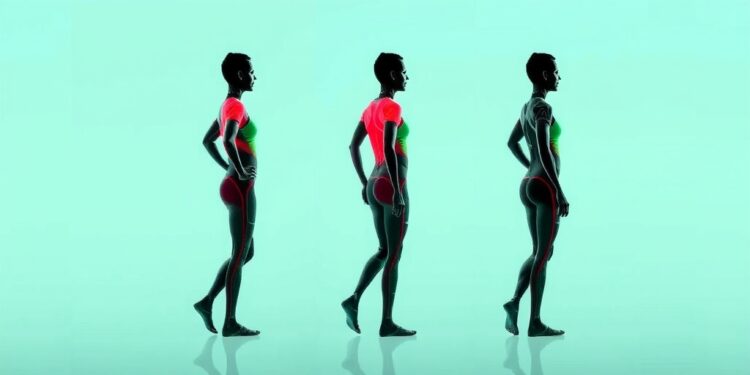Researchers at Cornell University have unveiled an innovative type of smart clothing that seamlessly integrates advanced technology into everyday apparel. This groundbreaking garment, known as SeamFit, offers the capacity to monitor a wearer’s posture and exercise routine without compromising comfort or style. Unlike existing fitness wearables that can often be clunky or restrictive, SeamFit presents itself as a standard short-sleeved T-shirt, allowing users to maintain a normal wardrobe while benefiting from the capabilities of wearable technology.
The genius behind SeamFit lies in its use of flexible conductive threads delicately sewn into the seams of the shirt—specifically around the neck, arms, and sides. These threads are crafted to maintain a comfortable feel while actively tracking the user’s movements during physical activity. The data collected from these threads feed into an artificial intelligence pipeline, which intelligently interprets the wearer’s actions, accurately identifying specific exercises and counting repetitions in real time.
One of the standout features of SeamFit is its autonomous function; there is no need for users to log their workouts manually. This is particularly revolutionary for individuals who may be less motivated to engage in detailed workout tracking. Instead, the shirt’s AI system does all the heavy lifting, allowing users to focus solely on their exercise routine without the distraction of having to track its progress.
When the user finishes their workout, the process of transitioning back to normal day-to-day life is incredibly straightforward. A small circuit board located at the back neckline of the shirt can be easily detached before tossing the garment into the washing machine, ensuring that the SeamFit shirt can be cleaned just like any regular piece of clothing. This is a significant advantage over more cumbersome body-tracking options prevalent in the market that require special handling or additional maintenance.
Current body-tracking technologies often involve tight, form-fitting clothes with hard-to-move sensors integrated within them. This can create discomfort and limit the effectiveness of movement, particularly during physical activities. Co-lead researcher Catherine Yu, a doctoral student at Cornell, emphasized her team’s commitment to creating smart clothing that remains practical for everyday use. She noted that the goal was to enhance the user experience by ensuring that the clothing feels just like any other item in their wardrobe.
For athletes and fitness enthusiasts who rely on devices such as smartwatches or fitness rings, SeamFit offers a more holistic alternative that captures data from the entire body rather than being limited to a single area. Many people find fitness trackers additional devices that can be cumbersome to wear during exercise, but SeamFit’s seamless integration into clothing eliminates this barrier, providing a more practical solution.
The study titled “SeamFit: Towards Practical Smart Clothing for Automatic Exercise Logging” was published in the Proceedings of the ACM on Interactive, Mobile, Wearable, and Ubiquitous Technologies. It is set to be showcased at the UbiComp/ISWC 2025 meeting, highlighting its significant implications for both the sports industry and everyday physical activity monitoring.
During the testing phase, volunteers were enlisted to participate in a diverse range of fourteen exercises, such as lunges, sit-ups, and bicep curls. Remarkably, the SeamFit technology achieved an impressive exercise classification accuracy rate of 93.4 percent. Furthermore, the counting of repetitions showed astounding precision, with discrepancies averaging less than one count—illustrating the shirt’s ability to provide reliable, real-time workout data.
The technology is founded on the principles of capacitance, which is a measure of the stored charge. As participants engaged in physical activity, the conductive threads in the garment underwent deformation and motion that influenced their capacitance. The circuit board relentlessly measures these changes and communicates the data through Bluetooth to a computer, where a sophisticated, lightweight signal-processing and machine-learning pipeline interprets the results.
Considering the growing importance of human-computer interaction, SeamFit stands to revolutionize how personal fitness can be monitored and understood. By comprehensively tracking movement and activity levels, the AI system can develop a better understanding of users’ needs and behaviors. This could lead to more intuitive interfaces between humans and AI, leading to personalized interactions based on users’ states, whether that may be active, resting, eating, or sleeping.
Further adaptations of SeamFit technology could potentially expand its applicability beyond basic garments, evolving to include specialized sportswear optimized for a variety of competitive activities. Professor François Guimbretière, a co-author of the study, echoed this sentiment, suggesting that the technology could tap into more complex garment designs to enhance performance tracking further and improve the user experience in specialized sports contexts.
The implications of this research extend beyond athletic performance monitoring, as they can play a pivotal role in health and wellness. The ability to collect accurate movement data from regular clothing could provide insights into physical activity trends, habits, and overall health for users across various demographics. SeamFit thus not only represents a step forward in smart clothing technology but also indicates the potential for integrating advanced monitoring into everyday life for the masses.
This novel development in wearable technology redefines smart clothing, proving that innovation does not necessarily mean compromising on comfort and style. SeamFit epitomizes a new era in athletic wear, merging the best elements of fashion with cutting-edge technology to support users in achieving their health and fitness goals with unprecedented ease. This shift towards practical, everyday smart clothing could significantly impact both personal lifestyles and the broader fitness and healthcare landscape.
The future of smart clothing looks promising with SeamFit paving the way for a multitude of applications, from competitive athletics to rehabilitative practices. As this technology continues to evolve, we may soon witness a shift where monitoring health becomes as effortless as wearing a t-shirt, fundamentally changing our approach to fitness and well-being in the modern world.
Subject of Research: Smart clothing technology for automatic exercise logging
Article Title: SeamFit: The Future of Smart Clothing
News Publication Date: October 2023
Web References: https://link.mediaoutreach.meltwater.com/
References: Proceedings of the ACM on Interactive, Mobile, Wearable and Ubiquitous Technologies
Image Credits: Cornell University
Keywords
Artificial intelligence, wearable devices, smart clothing, fitness tracking, technology integration, health, exercise monitoring.




